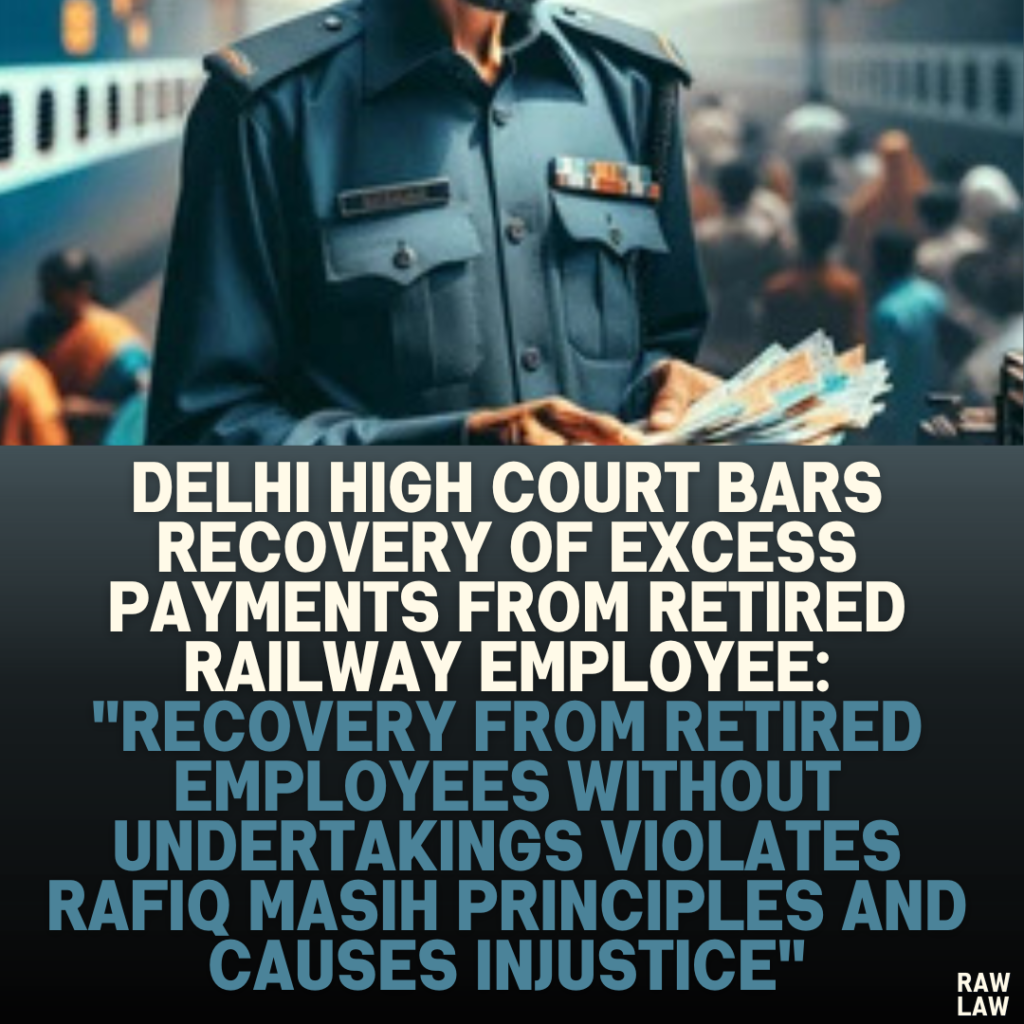Court’s Decision
The Delhi High Court dismissed a writ petition filed by the Union of India, which sought to challenge the order passed by the Central Administrative Tribunal (CAT). The CAT had held that recovery of excess payments made to the retired Chief Ticket Inspector was impermissible, relying on the principles laid down by the Supreme Court in State of Punjab v. Rafiq Masih (2015). The court emphasized that the principles in Rafiq Masih are binding and applicable to cases where recoveries cause undue hardship to retired employees.
Facts
- The respondent retired as a Chief Ticket Inspector in the Railways on August 31, 2016. On his retirement, his pension was to be calculated based on a basic pay of ₹66,000 per month.
- However, his pension was fixed based on a reduced basic pay of ₹64,100 per month. The reduction stemmed from an alleged overpayment made to him nearly ten years before his retirement.
- The respondent challenged the recovery of this amount and the revised pension calculation before the CAT by filing an Original Application.
- The CAT ruled in favor of the respondent, stating that recovery was barred under the principles laid down in Rafiq Masih. The Union of India then filed the present writ petition challenging the CAT’s order.
Issues
- Can the recovery of excess payments made nearly a decade before the respondent’s retirement be justified under the law?
- Are the principles set forth in Rafiq Masih applicable to this case?
- Does the precedent in Sanjay Sharma v. State of Punjab allow for such recovery?
Petitioner’s Arguments
- Reliance on Precedent: The petitioner argued that recovery was permissible based on the judgment in Sanjay Sharma v. State of Punjab (2023). It was claimed that in Sanjay Sharma, the court allowed recoveries even when Rafiq Masih was cited.
- Eligibility for Pay Scale: The petitioner contended that the respondent was not entitled to the higher pay scale of ₹66,000 at the time of his retirement, and therefore, the recovery was justified.
Respondent’s Arguments
- The respondent relied on the Supreme Court’s decision in Rafiq Masih, asserting that:
- Recovery from retired employees is impermissible, particularly when the excess payments were made several years before the order of recovery.
- The recovery would result in undue hardship to the respondent, who was a retired employee with limited financial resources.
- The respondent denied any complicity or fraudulent conduct in receiving the alleged overpayment.
Analysis of the Law
- Principles from Rafiq Masih: The Supreme Court in Rafiq Masih had laid down specific conditions under which recovery is impermissible. These include:
- Recovery from retired employees or employees nearing retirement.
- Recovery of amounts paid more than five years prior to the recovery order.
- Recovery in cases where the employee was not at fault and would suffer undue hardship.
- Distinction from Sanjay Sharma:
- The petitioner relied on the judgment in Sanjay Sharma, where recovery was allowed. However, the High Court distinguished the present case from Sanjay Sharma, emphasizing that:
- In Sanjay Sharma, the employee was complicit in self-approving the excess payment, knowing it was unauthorized.
- In contrast, the present respondent had no role in determining his pay scale or approving the excess payment.
- The petitioner relied on the judgment in Sanjay Sharma, where recovery was allowed. However, the High Court distinguished the present case from Sanjay Sharma, emphasizing that:
- Role of Undertaking in Recovery Cases: The court referred to High Court of Punjab and Haryana v. Jagdev Singh, which held that recoveries could be allowed if the employee had signed an undertaking agreeing to refund excess payments if detected. In this case, no such undertaking existed, further barring the recovery.
Precedent Analysis
- Application of Rafiq Masih Principles: The court reiterated that the principles in Rafiq Masih provide protection to retired employees and employees nearing retirement from unjust recoveries.
- Fraud or Complicity in Overpayments: The court distinguished this case from others, such as Sanjay Sharma, where fraud or willful complicity in receiving excess payments justified recovery. The court found no such elements of fraud or knowledge in the present case.
Court’s Reasoning
- The High Court found that the CAT correctly applied the principles of Rafiq Masih to hold that recovery in this case was unjustified.
- It emphasized that the respondent was a retired employee and had not signed any undertaking permitting recovery of excess payments. Further, the payments in question were made over a decade ago, making the recovery inequitable and legally unsound.
- The court also criticized administrative authorities for burdening the judiciary with cases already settled by binding precedents, observing that such cases unnecessarily clog the court’s docket.
Conclusion
The High Court upheld the CAT’s decision, dismissing the petition filed by the Union of India. It ruled that recovery from the respondent was impermissible under the principles laid down in Rafiq Masih. The court further directed administrative authorities to exercise discretion and avoid filing cases fully covered by binding judicial precedents.
Implications
- Reinforcement of Rafiq Masih Principles: The judgment strengthens protections for retired employees and employees nearing retirement from recovery of excess payments.
- Judicial Efficiency: The court’s observations highlight the need for administrative bodies to avoid filing cases that are already settled by precedents, thereby reducing the burden on the judiciary.
- Precedent for Future Cases: This judgment will serve as a reference point for similar cases, ensuring equitable treatment of retired employees and preventing unnecessary litigation.



